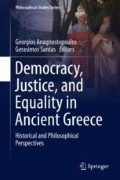Abstract
The topic of equality comes up in a variety of contexts in Aristotle’s Politics from Book II to VII. The desire for equality with equals and superiority to inferiors seems to play an important explanatory role for Aristotle in determining the characteristics of the constitution of a state and being a significant causal factor in constitutional change. He distinguishes between types of equality, numerical and proportional, and equality relative to some interest and unqualified equality. Aristotle appeals to his conception of equality in his explanation of the nature and types of democracy and oligarchy in the differentiation of the three types of good constitutions—monarchy, aristocracy and polity—and their less than ideal counterparts—tyranny, oligarchy and democracy—as well as in his analysis of political stability and constitutional change. Despite the complexity of his conception of equality and its political importance, Aristotle’s detailed descriptions of actual constitutions and constitutional changes seldom mention equality. How the desire for equality is explanatory or which type of equality is realized in a specific constitution is left to the reader to determine. The goal of this paper is to discover whether a coherent account of equality can be extracted, on Aristotle’s behalf, from what he does say. In the first two sections, we will look at the role equality plays in Aristotle’s descriptions of actual constitutions in Politics IV and V. The third section will examine the role equality plays in his design of an ideal constitution in Politics VII and VIII. We will conclude by summarizing the strengths and weaknesses of Aristotle’s approach to equality.
Access this chapter
Tax calculation will be finalised at checkout
Purchases are for personal use only
Notes
- 1.
To illustrate this distinction, Aristotle gives the following example, numerically 3 exceeds 2 and 2 exceeds 1 by an equal amount and by proportion 4 exceeds 2 and 2 exceeds 1 by an equal amount (1301b30-35). What is said to be numerically the same (3 > 1 = 2 > 1) is not the same as what is said to be proportionally the same (4 : 2 :: 2 : 1).
- 2.
Traditionally commentators have divided the Politics into three parts believed to have been written at different times and of little relevance to each other: I–III, IV–VI, and VII–VIII. See Rackham (1932, introduction). I will follow recent authors in querying this scheme. See Rowe (1991) for a very clear account of the history of the division of the Politics into three parts and the reasons for challenging it.
- 3.
Aristotle defines political justice in terms of proportional equality. In order to apply this principle, which similarities and differences among people are relevant to the exercise of political power must be specified. It is in the specification of these characteristics that Aristotle’s conception of equality differs from ours. For further discussion of this point, see Sects. 10.3 and 10.4 below.
- 4.
Although more typically Aristotle bases the democrat’s claim to power on liberty, in this context being more numerous is the respect appealed to by Aristotle on behalf of the poor.
- 5.
When Aristotle talks about the rich and the poor, he does not identify a class that is something over and above its members. To say that proportional equality holds between the two dominant classes is just to say that it holds between the members of those classes.
- 6.
Cf. Keyt who argues for a similar conclusion for somewhat different reasons: “In Book VI democratic justice and numerical equality are explicitly connected (1317b3-4, 1318a3-6). This connection is both puzzling in itself and contrary to what Aristotle said earlier (1301a25-35, 1301b35-40)” (1999, p.73).
- 7.
Barker (1962, introduction) points out similarities between this method of classification and the one Aristotle employs in his biological writings.
- 8.
This is but one of many puzzles about Aristotle’s classification of types of democracies in IV.4. As Robinson notes this is “an astonishingly unmethodical chapter” (1995, p. 81).
- 9.
Athenian history provided Aristotle with a model of a constitutional order, which blended democratic and oligarchic features. Ober describes the results of Solon’s reforms in this way: “Athenian citizens had gained a substantial measure of legal and political equality, but inequality persisted in the economic realm – and indeed material inequality was formally recognized in the distribution of public offices” (2015, p. 151).
- 10.
Barker (1962): “Aristotle is here drawing a distinction (based on Athenian constitutional history) between (1) a regime in which laws are distinguished from decrees, are superior to decrees, and cannot be overridden by decrees and (2) a regime in which the distinction has practically disappeared” (commentary on Pol. IV.4 1292a5-7, note 1).
- 11.
I thank the editors of this volume for calling this objection to my attention.
References
Barker, E. 1962. The Politics of Aristotle. Trans. Oxford: Oxford University Press.
Keyt, D. 1999. Aristotle Politics books V and VI. Trans. Oxford: Oxford University Press.
Keyt, D., and F.D. Miller Jr., eds. 1991. A companion to Aristotle’s Politics. Malden: Blackwell.
Ober, J. 2015. The rise and fall of classical Greece. Princeton: Princeton University Press.
Rackham, H., ed. 1932. Aristotle: Politics, Loeb Classical Library. Vol. 21. Cambridge, MA: Harvard University Press.
Robinson, R 1995. Aristotle Politics books III and IV. Trans. Oxford: Clarendon.
Rowe, C. 1991. Aims and methods in Aristotle’s Politics. In Keyt and Miller (1991).
Author information
Authors and Affiliations
Corresponding author
Editor information
Editors and Affiliations
Rights and permissions
Copyright information
© 2018 Springer International Publishing AG, part of Springer Nature
About this chapter
Cite this chapter
Modrak, D.K.W. (2018). Virtue, Equality, and Inequality in Aristotle’s Politics . In: Anagnostopoulos, G., Santas, G. (eds) Democracy, Justice, and Equality in Ancient Greece. Philosophical Studies Series, vol 132. Springer, Cham. https://doi.org/10.1007/978-3-319-96313-6_10
Download citation
DOI: https://doi.org/10.1007/978-3-319-96313-6_10
Published:
Publisher Name: Springer, Cham
Print ISBN: 978-3-319-96312-9
Online ISBN: 978-3-319-96313-6
eBook Packages: Religion and PhilosophyPhilosophy and Religion (R0)

